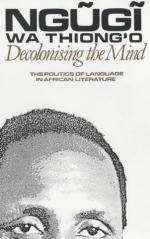
|
| Name: _________________________ | Period: ___________________ |
This quiz consists of 5 multiple choice and 5 short answer questions through Chapter 3 (Parts VI-X): "The Language of African Fiction".
Multiple Choice Questions
1. In the book Facing Mount Kenya, the Ituĩka ceremony is described as lasting how long?
(a) Two weeks.
(b) Six months.
(c) Three months.
(d) Two months.
2. The author states in his Introduction that he will look at the African realities as affected by the great struggle between two opposed forces in Africa today. These are an imperialist tradition and what?
(a) An arbitrarary tradition.
(b) A socialist tradition.
(c) A realist tradition.
(d) A resistance tradition.
3. What was the elitist institution for Africans in colonial Kenya where Ngũgĩ wa Thiong’o attended high school?
(a) The Niflheim High School.
(b) The Oxford High School.
(c) The Alliance High School.
(d) The Ndebele High School.
4. Hausa is the first language of approximately how many people?
(a) 20 million.
(b) 36 million.
(c) 10 million.
(d) 44 million.
5. When did the author submit The River Between to a writing competition by the East African Literature Bureau?
(a) 1989.
(b) 1969.
(c) 1956.
(d) 1961.
Short Answer Questions
1. During what years was Gakaara wa Wanjaũ detained in prison?
2. Who wrote Cry, the Beloved Country?
3. What were largely featured as the main characters in the stories that Ngũgĩ wa Thiong’o grew up listening to as a child?
4. Who was the President of the West German Federal Council in 1984?
5. What word from the text refers to something relating to the theory of knowledge, especially with regard to its methods, validity, and scope?
|
This section contains 241 words (approx. 1 page at 300 words per page) |

|




